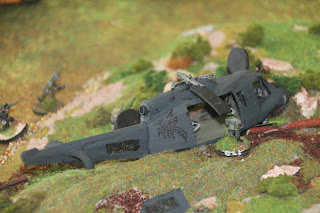The following is full of wild generalisations in order to make an arguement, it's not intended to be a dig at a certain demographic (within which I'd probably be counted) or even a certain games system: it's just my perception.
But you're here for the show, so a few words about that. I managed some snaps, the first groups were two very impressive Vietnam tables, one out in the boonies centered on the downed Huey and one set in Siagon itself. The detailing on the Siagon table in particular were worthy of a diorama, let alone being used as wargaming scenary.
The ground floor was packed with stands for vendors, but I have perviously learned by lesson when it comes to these shows, invariably something bought here is never used or ends up being passed on, so the only thing I did buy was a book. For research.
I have noticed that prices for things have generally increased. Which makes things pricey for me and I'm not badly off. If I was me of even ten years ago then a single purchase or two might be ok, but I couldn't afford a new game system/army/whatever. This is relevant for my later diatribe.
This in and of itself is not neccessary a problem. As long as there are more old white men coming into the hobby to replace those who get too old (or just keel over). But that might be a problem in the future, it is almost certain that those people have been wargaming for decades, so didn't enter the hobby as 'around retirement age'. ie twenty years ago, the demographic of a historically based wargaming event like this would have included a significant tranche of persons twenty years younger than those present in 2023. The average age of the historical wargamer would have been lower. Fight me.
40K, as we all know is specifically targeted and marketed at new players, who tend to be in their teens. People who might ot might not explore wargaming more generally, who might or might not wargame consistently thoughout their lives and who might or not 'leave the hobby' for years or even decades and then return. And the constantly changing meta encourages behaviour like having the prime army for each edition or update of the rules, rather then what we see in hisotrical wargaming where the same army might be used in multiple rulesets or formats. So the paradigm within which the games are played is different. And some people might struggle with that. If you start a conversation with someone about 40K they will assume that you're both talking about the latest edition.
So then there's the general state of society and the economy (stoopid). The next potential generations of wargamers for this type of thing are much much less likely to have the resources (money, time and space) as the current players, even when they get to the same point in their lives, perhaps they will be short on one of these at least.
So given the likely constraints on their future resources, the 40K paradigm of 'sell your army and get another one each time the rules change' makes sense: less space, some ROI. You only have to look at ebay each time there's a new edition or new flavour of the month codex.
This constant churn is possibly the antithisis of historical wargaming. Your ECW army might be good for multiple rule sets and be used for more than one depending on what type of game you want to play that day. And by adding in or leaving out cerrtain units you could use most the ECW army in the Wars of Spanish Succession or even 30 Years War. A markedly different paradigm and one suited to the more available time and space for it as well as the cash to acquire it in the first place.
But I would contend that what is seen at events like Salute is not the real picture, that events like Colours show that there is very real chance that historical wargaming in the form it currently has (and it's a great time for the hobby with new manufacturers of just about everything and 3D printing as well) is unlikely to survive another twenty years. It's just seems not to be getting new players.
Do I think its doomed ? Amongst all the new stuff there is a lot to appeal to those who are fed up with the revolving door nature of 40K - a host of new games in short play, skirmish format based on commando raids, weird WW2, Dr Who, Blakes 7, Flash Gordon and so on. Currently a lot of these games appeal to certain demographic (Dr Who, Blakes 7, Space 1999 and so on certainly date us all to between Quatermass and the Pit and Star Wars). But products like the Star Wars games, like the GoT game by CMON and others which may follow on might just be enough to spark some interest in historical gaming and keep it alive.










